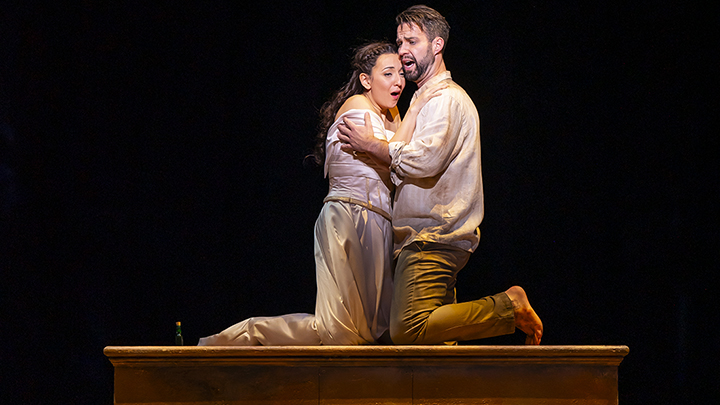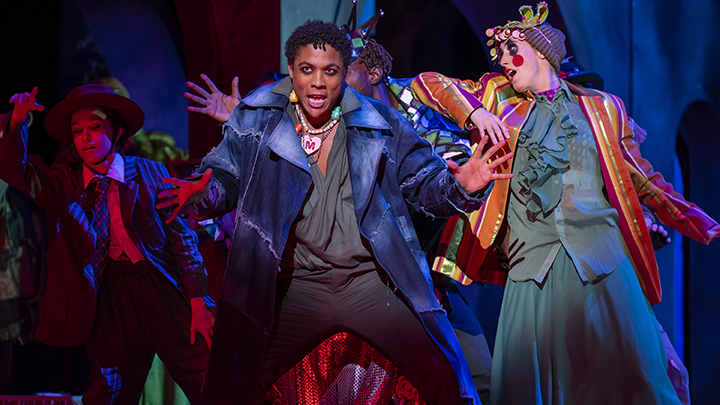For its second outing of the season, Washington National Opera presented an engaging revival of Charles Gounod’s evergreen 1867 Roméo et Juliette, a substantially streamlined adaptation of Shakespeare’s play via Jules Barbier and Michel Carré’s French libretto.
Rosa Feola, hailed last year for her Gilda at the Met, brought a level of vocal refinement and elegance to Juliet that substantially elevated the night’s proceedings. Her precise, iridescent soprano soared in Act I’s “Je Veux Vivre,” Feola handling Juliet’s coloratura passages with easy confidence and capping the aria with a blazing and generous final high note. Delicate dynamic effects and vivid attention to the French contributed to a captivating vocal performance throughout.
Her Juliet was a decidedly self-assured young heroine, commanding in moments like
“Amour, ranime mon courage” as Juliet resigns herself to taking the poison. But we missed some sense of Juliet’s extreme youth and inexperience early on to put these moments in context and add danger to the drama: “Je Veux Vivre” seemed more the statement of a knowing coquette than a novice, a more wholesome “Sempre Libera.”
Feola’s beau wasn’t much help in the teenage innocence department. British tenor Adam Smith’s confident “Bromeo” seemed to approach the courtship with all the youthful naivete of a b-school grad working a happy hour, though his dramatic credibility improved in the headier material following Tybalt’s death. Smith’s vocal performance had its own charms, however, his abundant, bronzed tenor filling the auditorium for crowd-pleasing climaxes in passages like Act II’s “Ah! Leve-toi le soleil.” An affinity for little croony effects added a further measure of throwback personality, though any sense of French style remained strictly limited.
The leads’ partnership deepened as the evening progressed, from a relatively inert balcony scene to a bedroom scene that built to a poignant parting, and ultimately a genuinely thrilling finale in the tomb. A few chuckles at the libretto’s choice to keep Romeo alive long enough for one more duet (apparently common performance practice in 19th century presentations of the actual play, too!) were silenced as the singers pushed each other to an intense vocal conclusion.
Highlights among the large supporting cast included the rival house hotheads, Mercutio (Justin Austin) and Tybalt (Duke Kim), who brought convincing tribal hostility to the opening party scene exchanges and tragic duel. Austin demonstrated a particularly charismatic stage presence in his duel sequence, while his earlier “Queen Mab” showcased a focused, expressive baritone.
Undeterred by the relative short shrift nursemaid Gertrude gets in the opera, mezzo-soprano Jill Grove delivered an endearing performance that elicited most of the evening’s laughs (not at the expense of the libretto), while Nicolas Testé’s comforting bass gave her partner in crime, Frere Laurent, a thoughtful authority. Winona Martin offered an attractive mezzo sound for page Stéphano, though the Act III opener “Que fais-tu, Blanche Tourterelle?” lacked a bit of needed sparkle.
WNO Principal Conductor Evan Rogister, in his only appearance this season, handily brought forward the potboiler elements of Gounod’s score in a performance that never risked growing dull or indulgent, the work’s nearly three hours flying by under his baton. Large format scenes like the fateful duel and opening party brimmed with a sense of forward momentum and energy, aided by winning, responsive performances from the WNO Opera Orchestra and Chorus.
The flipside of all the excitement in the pit was an occasional glibness that could shortchange some of the weightier emotional beats in the score. In passages like the secret wedding scene and a few of the leads’ arias, Rogister seemed reticent to give the melodrama sufficient time to breathe, leaving the overall evening feeling perhaps a bit too efficient.
This co-production with the Glimmerglass festival heavily frontloads its visual inspiration with a riotous circus-themed Capulet ball in Act I, to the degree that I was half preparing for the whole production to dig in on the circus theme, perhaps recasting the families as warring carny factions. But unfortunately (fortunately?) the circus thing was dropped and the balance of the evening offered a fairly straightforward take. Costumes (Loren Shaw) were a hodgepodge of contemporary styles (the Capulets and Montagues looked like the mafia fighting a combination of greasers and the crew from The Warriors), but the direction (Simon Godwin) didn’t seem interested in deriving further insights from this updating.
The physical production (sets by Daniel Soule and lighting by Robert Wierzel) further confused matters, as it centered on a simple Renaissance-style arcade and props that could easily be applied to a period dress production instead of the “updated” staging here. While I’m sure this adequately filled out the summer festival stage, the production looked a bit underwhelming in the opera house relative to WNO’s past presentations of the warhorse repertoire.
Photos: Scott Suchman




